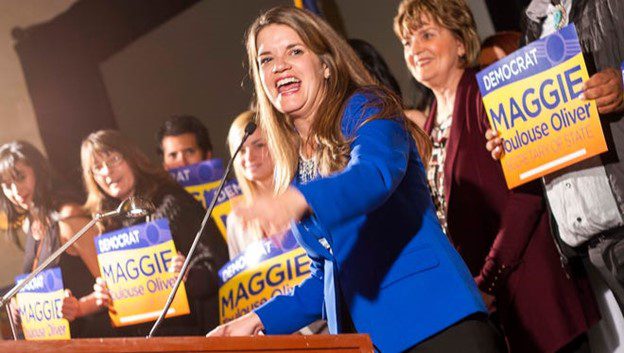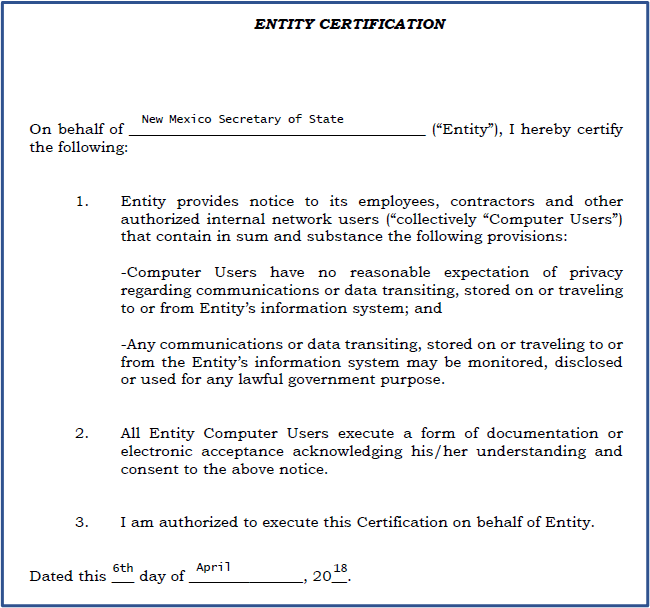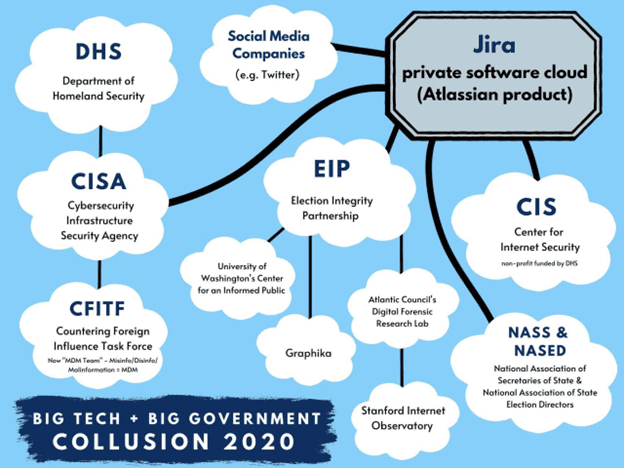Recent bombshell articles reveal that New Mexico’s Secretary of State, Maggie Toulouse Oliver, has illegally centralized New Mexico’s elections, exposed them to the internet, processes them on uncertified software, and has lied about it to the New Mexico legislature.
Toulouse-Oliver has also granted the federal government essentially full access to county election systems through surveillance devices called “Albert Sensors” provided by a private, non-profit called Center for Internet Security (CIS). Coincidentally, CIS is a main player in the censorship scheme carried out by our own federal government, Democrat non-profits, big tech, and state election officials to silence Americans’ concerns about the 2020 election.

In 2018, an agency under the Department of Homeland Security (DHS) called the Cybersecurity and Infrastructure Security Agency (CISA) partnered with CIS to provide “Cybersecurity Services” for state election entities. DHS began to pressure state and local election officials to install Albert Sensors in their networks so they can be monitored 365 days a year by the federal government through CIS. CIS is in East Greenbush, New York, has 300 employees, and a $51 million annual budget.
In early 2020, just as the country was going into lockdown, CIS launched a new program called RABET-V for “verifying the security of…non-voting election technology.” Non-voting technology includes electronic poll books, election night reporting, electronic ballot delivery, etc. CIS described the activities of RABET-V in a white paper as having taken election night reporting and pollbook software from two providers and developed a process for verifying that these products are “secure” despite massive evidence to the contrary.
The white paper was written by CIS’s Senior Director of Election Security, Arron Wilson, who happens to be founder and CEO of an electronic ballot delivery company call Enhanced Voting.
Toulouse-Oliver jumped on board with the Orwellian Albert Sensor program almost as soon as it was launched by signing a Memorandum of Agreement (MOA) with CIS in April 2018. As part of the agreement, Toulouse-Oliver was required to give CIS a complete network diagram of New Mexico’s election systems, internet access to manage devices, a complete list of IP addresses of county computers, a list of servers, and other information. In return, CIS claimed they would monitor traffic going into and out of New Mexico’s election networks and employ an intrusion detection system to detect security threats. Most, if not all states, have since followed Toulouse-Oliver’s lead and installed Albert Sensors on their election networks.
Two statements in the MOA reveal that CIS can see a lot more than patterns of internet traffic through their Albert Sensors. The MOA requires the entity accepting its services to provide notice to its employees and contractors that they “have no reasonable expectation of privacy regarding communications or data transiting, stored on or traveling to or from [the SOS/County] information systems, and any communications or data transiting, stored on or traveling to or from the [the SOS/County] information system may be monitored disclosed or used for any lawful government purpose.”

We requested communications between the DHS, CIS and the SOS’s office to see if any security alerts or reports have been provided to the SOS over the last five years since the Albert Sensors were deployed in New Mexico. We were told no such communications exist. It appears there is no evidence that CIS has alerted the SOS of any cyber-attacks or even provided any reports on their monitoring activities.
Similar requests sent to individual counties were even less successful – as many of the counties did not know what Albert Sensors are. The fact that counties do not seem to be aware that their networks are being monitored 24/7 by the federal government is a shocking revelation. Yet, Toulouse-Oliver implied in testimony to the US Senate on March 28, 2023, that Albert Sensors are deployed statewide by her office, which “takes the resources and tools we receive from the federal government and our private partners and be able to make sure that those are all available downward to every local election jurisdiction across the state.”
If the individual counties are unaware that they are being monitored, that likely means that the SOS has failed to provide notice to county officials that they have no expectation of privacy for any communications or data passing through their networks.
Prior to the creation of CIS and the installation of Albert Sensors inside election systems, the DHS offered states assistance with cyber-hygiene scans and penetration testing prior to the 2016 election. Not all states took them up on this offer, but that didn’t stop the DHS from testing the limits of state election systems anyway. The DHS drew the ire of then Secretary of State of Georgia, Brian Kemp, for attempting to hack into his election system without permission or warning shortly after the 2016 General Election. Such a hack violated 18 USC 1030, which makes attempting to gain access to protected computer systems illegal.
If the DHS would attempt to illegally hack into a state’s election system, why should anyone trust them to have their hands in election networks all over the country?
Recent occurrences in Washington state suggest Albert Sensors don’t even work as advertised.
Lincoln County and Okanogan County in Washington were both victims of cyber-attacks after the installation of their Albert Sensors, but CIS failed to detect the hacks or alert the counties. Lincoln County canceled its contract with CIS as a result and inspired nearby Ferry County to cancel theirs as well.
What seemed like a reasonable course of action to the county commissioners in Lincoln and Ferry Counties based on the failure of CIS’s service to alert them of a serious intrusion, caused state-sponsored media, NPR, to conduct a national smear campaign against tiny Ferry County with an article and audio report branding the Ferry County Commissioners as misinformation-spreading election deniers.
NPR’s overt-the-top hit piece on Ferry County featured a DHS spokesperson who stated that Albert Sensors are “the best tool that federal government has to see the entire landscape of what’s happening in cyberspace at these local election offices.” Why does the federal government need to see what’s going on in local election offices over which the federal government has no jurisdiction?
Further, we are constantly told that our elections are secure and not exposed to the internet. Then why is the federal government, some election officials, and state-sponsored media so worried about a tiny county who decided to ditch their Albert Sensors?
NPR’s attack on Ferry County is reminiscent of the national smear campaign by New Mexico’s SOS and Attorney General against the Otero County Commission and Otero County residents who were conducting a door-to-door canvass to determine the accuracy of Otero County’s voter rolls last spring. The Otero County canvass revealed that Otero counties rolls are woefully out-of-date and show signs of voter fraud and digital manipulation.
Smear campaigns, name calling, and censorship seem to be the universal reaction of the federal government, election officials, social media giants, and legacy media outlets all over the country to any challenge whatsoever over the status quo of our elections – no matter how reasonable the facts.
Remember this graphic displayed during U.S. Representative Anna Paulina Luna’s testimony before the US House Oversight Committee in February that we covered in this article?

The graphic describes the players in a scheme between government, big tech, Democrat organizations, and election officials to outright violate the first-amendment rights of Americans when it comes to our elections, the COVID response, and information on the Hunter Biden laptop. All the entities responsible for bringing us Albert Sensors are on this graphic, and Maggie Toulouse Oliver was president of NASS during the 2020 election.
Until the 2020 election, there has never been widespread questioning of the results of a U.S. election, or widely held concerns over the election systems themselves. The honor of denying elections prior to 2020 was held for a select few Democrats, such as Hillary Clinton, Stacey Abrams, and Kamala Harris. But they were never called names, and there were no national smear campaigns launched to destroy them for their beliefs that an election could be stolen.
So why were certain sectors of the government, the Democrat party, election officials, and biased social media platforms anticipating the need to crush open discussion of the multitude of anomalies and illegal actions that occurred during the 2020 election? Why were those same entities busy setting up Albert Sensors in as many counties as possible between 2016 and 2020 elections to give the DHS the ability to “see the entire landscape of what’s happening in cyberspace at…local election offices”?
It’s almost as if they knew millions of people were going to question the outcome of 2020, and they had to be prepared to shut it down through name-calling, public shaming, and censorship.
Their crown jewel of operations against the American people was the ridiculous term of “violent insurrectionists” applied to the million American citizens who showed up to Washington DC on January 6th to protest what they believed was a stolen election. The recent revelation of the Twitter files and release of the Capital surveillance footage has shown this pejorative to be a ridiculous fiction. Jacob Chansley – the media’s most villainized protestor – was released over a year early after it was revealed that he was escorted around the capital and let into the Senate chambers by none other than Capitol Police officers.
The facts are clear: the DHS, CISA, CIS, NASS, and Maggie Toulouse-Oliver were getting Albert Censors installed in as many counties as they could, while they were simultaneously setting up a far-reaching, powerful censorship network.
Albert Sensors failed to alert counties of real, harmful intrusions all while a big government Faustian bargain was struck. An Orwellian surveillance program was installed in local counties, with most clerks ignorant to its existence. Yet, the SOS signed off on an agreement where local officials have no reasonable expectation of privacy of their data.
The conclusions seem obvious: The DHS, CISA, NASS, and Maggie Toulouse-Oliver are not acting in good faith. Our elections are exposed to the internet, Albert Sensors can give corrupt pockets of our government real-time data about the outcome of our elections, and time to react if the data doesn’t support the political outcomes they desire. When legitimate investigators and auditors uncover disturbing manipulation of our elections, the censorship regime quickly attempts to silence, smear, and destroy anyone that reveals the truth.
- Breaking: Dominion/Liberty Vote Tabulator flips a vote in Chaves County – Changing the Outcome of a School Board Election - December 12, 2025
- Liberation for New Mexico is Coming - August 18, 2025
- ATTENTION DOGE: Department of Energy’s Land Grab in New Mexico and Colorado for “Green Energy” Must be Stopped - February 17, 2025


